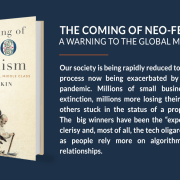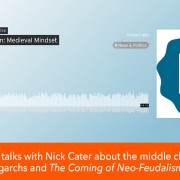Feudalism Without A Soul
Casey Chalk reviews The Coming of Neo-Feudalism
Perhaps one of the great cons of the twenty-first century has been corporate America’s success in deceiving middle-class and lower-class Americans that corporations are on their side, while profiting from international tax havens and cheap foreign or immigrant labor that reduces American jobs and keeps money from American taxpayers. Major American businesses declare their woke credentials vis-à-vis Black Lives Matter, #MeToo, and other activist causes, while they send their jobs (and even sometimes their headquarters) overseas. Companies denounce “toxic masculinity” while benefiting from foreign child labor.
Someone who perceptively analyzes this broader trend—in which tech oligarchs and thought leaders in the media, academia, and entertainment industry ally for shared purposes—is Joel Kotkin, a Presidential Fellow in Urban Futures at Chapman University. In The Coming of Neo-Feudalism, Kotkin argues that increasing social stratification across the globe—with a small technocracy and clerisy at the top and a large, uneducated, dependent serf class at the bottom—represents a new, modern feudalism. What binds these two groups together (oligarchs being the feudal lords; thought leaders, the clerics) are shared views on globalism, cosmopolitanism, credentialism, and technocratic expertise.
The tech oligarchs seek to dominate the world financially and technologically. The clerisy in turn aim to undermine traditional bourgeois values with progressive ideas about globalism, environmental sustainability, redefined gender roles, and the authority of experts. They inculcate these values through their “dominance over the institutions of higher learning and media, aided by the oligarchy’s control of information technology and the channels of culture.” Both groups perceive a powerful central government as essential to carrying out their political, social, and economic objectives, and thus the need for an unassailable, credentialed “expert class.”
Kotkin marshalls a host of arresting economic data to demonstrate the widening gulf between the feudal lords and everyone else. The share of global wealth held by the top 1 percent of the global population, for example, increased from 7 percent in 1978 to 22 percent in 2012. By 2030, the top 1 percent is expected to control two-thirds of world wealth, according to one study.
The combined wealth of the richest four hundred Americans exceeds the total wealth of 185 million fellow Americans. Half of the world’s assets are owned by one hundred billionaires, a dramatic consolidation from just five years ago. The proportion of land owned by the one hundred largest private landowners grew by nearly 50 percent between 2007 and 2017.
“Economists may point to better aggregate growth and lower prices for consumers,” observes Kotkin, “But most people do not live in ‘the aggregate.’ They live in their individual reality, which in many cases has gotten bleaker even as the economy overall has improved.” Indeed, what the data indicates is a perhaps unprecedented transfer of wealth from the middle class to the top 1 percent. Coupled with a dramatic decline in homeownership—a marker of economic and social stability—this creates a class of permanent renters, otherwise known as serfs.
There are many other manifestations of this consolidation and centralization. America (and the globe) are dominated by an increasingly short list of tech companies, helped in part by the precipitous fall (61 percent) in antitrust actions in the United States since the early 1980s. Google has purchased 240 companies as of January 2020, and controls nearly 90 percent of search advertising. Facebook controls almost 80 percent of mobile social traffic. Amazon controls nearly 40 percent of the world’s cloud business as well as 75 percent of U.S. ebook sales. Google and Apple together provide 95 percent of operating software for mobile devices. Microsoft accounts for over 80 percent of the software that runs personal computers.
Read the rest of this book review at The University Bookman.









